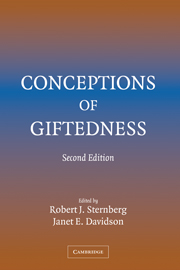Book contents
- Frontmatter
- Contents
- Preface
- List of Contributors
- 1 Gifted Education Without Gifted Children: The Case for No Conception of Giftedness
- 2 Youths Who Reason Exceptionally Well Mathematically and/or Verbally: Using the MVT:D4 Model to Develop Their Talents
- 3 A Child-Responsive Model of Giftedness
- 4 School-Based Conception of Giftedness
- 5 Giftedness, Talent, Expertise, and Creative Achievement
- 6 Permission to Be Gifted: How Conceptions of Giftedness Can Change Lives
- 7 From Gifts to Talents: The DMGT as a Developmental Model
- 8 Nurturing Talent in Gifted Students of Color
- 9 The Munich Model of Giftedness Designed to Identify and Promote Gifted Students
- 10 Systemic Approaches to Giftedness: Contributions of Russian Psychology
- 11 Giftedness and Gifted Education
- 12 The Importance of Contexts in Theories of Giftedness: Learning to Embrace the Messy Joys of Subjectivity
- 13 Feminist Perspectives on Talent Development: A Research-Based Conception of Giftedness in Women
- 14 The Three-Ring Conception of Giftedness: A Developmental Model for Promoting Creative Productivity
- 15 In Defense of a Psychometric Approach to the Definition of Academic Giftedness: A Conservative View from a Die-Hard Liberal
- 16 Creative Giftedness
- 17 Genetics of Giftedness: The Implications of an Emergenic–Epigenetic Model
- 18 The WICS Model of Giftedness
- 19 Beyond Expertise: Conceptions of Giftedness as Great Performance
- 20 Domain-Specific Giftedness: Applications in School and Life
- 21 Extreme Giftedness
- 22 Making Giftedness Productive
- 23 The Actiotope Model of Giftedness
- 24 The Scientific Study of Giftedness
- Author Index
- Subject Index
7 - From Gifts to Talents: The DMGT as a Developmental Model
- Frontmatter
- Contents
- Preface
- List of Contributors
- 1 Gifted Education Without Gifted Children: The Case for No Conception of Giftedness
- 2 Youths Who Reason Exceptionally Well Mathematically and/or Verbally: Using the MVT:D4 Model to Develop Their Talents
- 3 A Child-Responsive Model of Giftedness
- 4 School-Based Conception of Giftedness
- 5 Giftedness, Talent, Expertise, and Creative Achievement
- 6 Permission to Be Gifted: How Conceptions of Giftedness Can Change Lives
- 7 From Gifts to Talents: The DMGT as a Developmental Model
- 8 Nurturing Talent in Gifted Students of Color
- 9 The Munich Model of Giftedness Designed to Identify and Promote Gifted Students
- 10 Systemic Approaches to Giftedness: Contributions of Russian Psychology
- 11 Giftedness and Gifted Education
- 12 The Importance of Contexts in Theories of Giftedness: Learning to Embrace the Messy Joys of Subjectivity
- 13 Feminist Perspectives on Talent Development: A Research-Based Conception of Giftedness in Women
- 14 The Three-Ring Conception of Giftedness: A Developmental Model for Promoting Creative Productivity
- 15 In Defense of a Psychometric Approach to the Definition of Academic Giftedness: A Conservative View from a Die-Hard Liberal
- 16 Creative Giftedness
- 17 Genetics of Giftedness: The Implications of an Emergenic–Epigenetic Model
- 18 The WICS Model of Giftedness
- 19 Beyond Expertise: Conceptions of Giftedness as Great Performance
- 20 Domain-Specific Giftedness: Applications in School and Life
- 21 Extreme Giftedness
- 22 Making Giftedness Productive
- 23 The Actiotope Model of Giftedness
- 24 The Scientific Study of Giftedness
- Author Index
- Subject Index
Summary
The field of gifted education defines its special population around two key concepts: giftedness and talent. Using the entries for these two terms in the Subject Index of the first edition of this book (Sternberg & Davidson, 1986) – or, for that matter, the present edition or any handbook in the field (e.g., Colangelo & Davis, 2003; Heller, Mönks, Sternberg, & Subotnik, 2000) – the curious browser will soon discover the fascinating creativity of scholars in their attempts to circumscribe the nature of giftedness and talent. In some cases, the concept of talent does not appear or is not defined (e.g., Davidson, 1986; Renzulli, 1986; Sternberg, 1986); in other cases, which is the dominant position in the literature, both terms are used as synonyms, as in Marland's (1972) well-known definition (“Gifted and talented children are. … ” p. 4). Csikszentmihalyi and Robinson explicitly announce that nondifferentiation, stating: “talent, giftedness, and prodigious performance [italics in text] will be used interchangeably” (1986, p. 264). Occasionally, talent becomes a subcategory of giftedness: “The second component of giftedness is talent,” affirms Feldhusen (1986, p. 113); or “giftedness encompasses a wide variety of abilities, talents, or propensities” (Haensly, Reynolds, & Nash, 1986, p. 131). For his part, Feldman (1986) associates talent with potential and giftedness with achievement. He affirms: “Talent from a cognitive-developmental perspective is the potential for constructive interaction with various aspects of the world of experience. … If these processes of interaction lead to high level performance, then it is appropriate to speak of giftedness” (p. 287).
- Type
- Chapter
- Information
- Conceptions of Giftedness , pp. 98 - 119Publisher: Cambridge University PressPrint publication year: 2005
- 148
- Cited by

